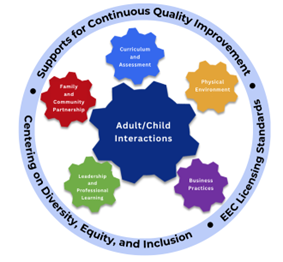The Quality Rating and Improvement System (QRIS) is currently paused while EEC works to develop a continuous quality improvement system and undergoes child care licensing revisions.
Also, as of July 1, 2023 (implemented February 1, 2024) quality funding has been incorporated into the base rates moving forward for Child Care Financial Assistance rates. This means the 8.5% quality add-on from fiscal year 2023 and the 3% QRIS add-on are no longer shown as separate rates. Programs no longer need a QRIS rating to receive these rates. Learn more.
EEC Program Quality Focus Areas
EEC encourages programs to focus on these six domains of program quality and work together in sync to support positive child outcomes driven by adult/child interactions. This includes establishing a strong commitment to diversity, equity, and inclusion, as well as implementing continuous quality improvement across all domains to ensure that programs are providing the best possible experiences for children.
- Leadership and Professional Learning
Leadership and Professional Learning refer to establishing a program structure that provides ongoing supervision, opportunities for educators to access planning time, collaborate and reflect to deepen their knowledge and skills, and continuously improve teaching practices.
- Physical Environment
The physical environment refers to the indoor and outdoor spaces, equipment, and materials that are intentionally designed and arranged to support children’s learning and development. A well-designed environment plays a critical in supporting children’s exploration, discovery, and active engagement in learning.
- Curriculum and Assessment
Curriculum refers to the learning objectives, content, and teaching strategies that support the growth of young children. Assessment is the process of gathering information about child’s progress and development to provide appropriate support. They provide educators with a framework for planning and implementing teaching, as well as gauging the effectiveness of their teaching.
- Adult/Child Interactions
Positive relationships with adults are crucial for children’s learning and development. By providing support, simulation, and guidance, adults can help children grow academically, behaviorally, socially, and emotionally. Creating nurturing environment through positive and meaningful relationship can promote children’s overall well-being and enable them to reach their full potential.
- Business Practices
Business Practices encompass program’s ability to effectively implement fiscal management, marketing and outreach, and compensation practices, which are essential for ensuring operational stability and sustainability.
- Family and Community Partnership
Family and Community Partnership is a collaborative and supportive relationship between families and communities with educational programs. The goal is to create an integrated system to support children’s learning and development through respect, empowerment, open communication, and active involvement.
High-Quality Learning & Care Environments
Defining high-quality learning and care environments:
- Characterized by frequent warm, supportive and stimulating interactions
- Children have opportunities to play and explore in a safe and engaging environment
- Planful curriculum shapes opportunities to learn through active experiences in ways that are responsive to individual needs
- Families are empowered to engage in collaborative partnerships and programs are inclusive and supportive to the diversity of families and children they serve
Program Quality Theory of Action
Ensuring that high-quality early education and care is available and accessible to all families and children in Massachusetts will enable:
- Families to have the resources to thrive socially and economically
- Children to be well prepared for school success and life-long learning
| Domain of Quality | Description | Tips for Educators | Tips for Program Leaders | Videos |
|---|---|---|---|---|
| Adult/Child Interactions |
|
|
| Here is what this looks like: https://youtu.be/a9m5trmh1Lw |
| Curriculum & Assessment |
|
|
| Here is what this looks like (infants): https://youtu.be/K7Ku6EcCQGU Here is what this looks like (older kids): https://youtu.be/jqeByELyyx8 |
| Physical Environment |
|
|
| Here is what this looks like: https://youtu.be/9dOxyomUSW8 |
| Family Engagement |
|
|
| Here is what this looks like: https://youtu.be/_TVFWVqPrfY |
Quality also includes:
- Leadership and Professional Learning
Educational leader creates a sustained focus on effective educator practices supporting play and learning =
• Adult-child interactions
• Curriculum and assessment
• Physical environment
• Working with families as partners
- Business Practices
Leadership supports strong program operations =
• Educational leadership to support continued professional growth of educators
• Effective business and administrative practices ensure programs stability and investment in quality, including educator compensation
